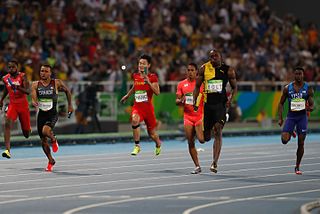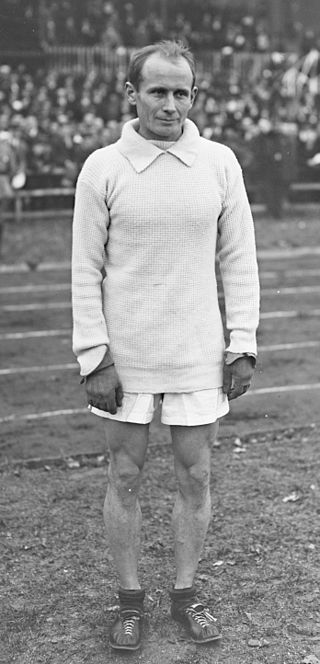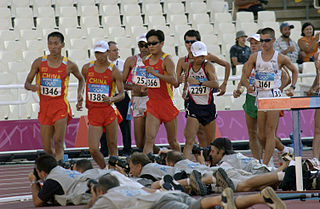
The 4 × 100 metres relay or sprint relay is an athletics track event run in lanes over one lap of the track with four runners completing 100 metres each. The first runners must begin in the same stagger as for the individual 400 m race. Each runner carries a relay baton. Before 2018, the baton had to be passed within a 20 m changeover box, preceded by a 10-metre acceleration zone. With a rule change effective November 1, 2017, that zone was modified to include the acceleration zone as part of the passing zone, making the entire zone 30 metres in length. The outgoing runner cannot touch the baton until it has entered the zone, and the incoming runner cannot touch it after it has left the zone. The zone is usually marked in yellow, frequently using lines, triangles or chevrons. While the rule book specifies the exact positioning of the marks, the colours and style are only "recommended". While most legacy tracks will still have the older markings, the rule change still uses existing marks. Not all governing body jurisdictions have adopted the rule change.

The 3000 metres or 3000-metre run is a track running event, also commonly known as the "3K" or "3K run", where 7.5 laps are run around an outdoor 400 m track, or 15 laps around a 200 m indoor track.

Sweden competed at the 1920 Summer Olympics in Antwerp, Belgium. 260 competitors, 247 men and 13 women, took part in 100 events in 18 sports.

The United States competed at the 1920 Summer Olympics in Antwerp, Belgium. 288 competitors, 274 men and 14 women, took part in 113 events in 18 sports.

The Netherlands competed at the 1920 Summer Olympics in Antwerp, Belgium. 130 competitors, 129 men and 1 woman, took part in 58 events in 15 sports.

Belgium was the host nation for the 1920 Summer Olympics in Antwerp. 336 competitors, 326 men and 10 women, took part in 121 events in 23 sports.

The men's 3000 metres team race was a track and field athletics event held as part of the athletics at the 1912 Summer Olympics programme. It was the fourth appearance of a team race style event, though the first to be held at the distance of 3000 metres, which became the standard until the event was eliminated following the 1924 Summer Olympics. The competition was held on Friday, July 12, 1912, and on Saturday, July 13, 1912.

The men's 200 metres event was part of the track and field athletics programme at the 1920 Summer Olympics. The competition was held on Thursday, August 19, 1920, and on Friday, August 20, 1920. Forty-eight sprinters from 22 nations competed. Nations were limited to 4 athletes each, down from the 12 allowed in previous Games. The event was won by Allen Woodring of the United States, the nation's second consecutive victory in the event and fourth in five Games. Fellow American Charley Paddock took silver. Great Britain reached the podium for a second consecutive Games with Harry Edward's bronze.
The men's 400 metres event was part of the track and field athletics programme at the 1920 Summer Olympics. The competition was held on Thursday, August 19, 1920, and on Friday, August 20, 1920. 37 runners from 16 nations competed. No nation had more than 4 runners, suggesting the limit had been reduced from the 12 maximum in force in 1908 and 1912. The event was won by Bevil Rudd of South Africa, the nation's first title in the event. Nils Engdahl's bronze was Sweden's first medal in the 400 metres.
The men's 800 metres event was part of the track and field athletics programme at the 1920 Summer Olympics. The competition was held from Sunday, August 15, 1920, to Tuesday, August 17, 1920. Forty runners from 17 nations competed. No nation had more than 4 runners, suggesting the limit had been reduced from the 12 maximum in force in 1908 and 1912. The event was won by Albert Hill of Great Britain, snapping a three-Games streak of American victories and starting a four-Games streak of British wins. Bevil Rudd, the 400 metres winner in 1920, took bronze to give South Africa its first medal in the 800 metres.
The men's 1500 metres event was part of the track and field athletics programme at the 1920 Summer Olympics. The competition was held on Wednesday, August 18, 1920, and on Thursday, August 19, 1920. Twenty-nine runners from 12 nations competed. No nation had more than 4 runners, suggesting the limit had been reduced from the 12 maximum in force in 1908 and 1912. The event was won by Albert Hill of Great Britain, completing his middle-distance double. It was the nation's second consecutive and third overall championship in the men's 1500 metres.
The men's 5000 metres event was part of the track and field athletics programme at the 1920 Summer Olympics. The competition was held on Monday, August 16, 1920, and on Tuesday, August 17, 1920. Thirty-eight runners from 16 nations competed.

The men's marathon event was part of the track and field athletics programme at the 1920 Summer Olympics. The distance of this race was 42.75 kilometres. The competition was held on Sunday, 22 August 1920. 48 runners from 17 nations competed. No nation had more than 4 runners, suggesting the limit had been reduced from the 12 maximum in force in 1908 and 1912. The event was won by Hannes Kolehmainen of Finland, the nation's first Olympic marathon medal and victory; Kolehmainen received his fourth gold medal, having won the 5000 metres, 10,000 metres, and individual cross country in 1912. Estonia and Italy also won their first marathon medals.
The men's 3000 metres steeplechase event was part of the track and field athletics programme at the 1920 Summer Olympics. The competition was held on Wednesday, August 18, 1920, and on Friday, August 20, 1920. Sixteen runners from six nations competed.

The men's 4 × 100 metres relay event was part of the track and field athletics programme at the 1920 Summer Olympics. It was the second appearance of this event. The competition was held on Saturday, August 21, 1920, and on Sunday, August 22, 1920. Fifty-two runners from 13 nations competed.
The men's 3 kilometres walk event was part of the track and field athletics programme at the 1920 Summer Olympics. The competition was held on the track on Friday, August 20, 1920, and on Saturday, August 21, 1920. Twenty-two race walkers from twelve nations competed.
The men's 10 kilometres walk event was part of the track and field athletics programme at the 1920 Summer Olympics. The competition was held on Tuesday, August 17, 1920, and on Wednesday, August 18, 1920. Twenty-three race walkers from 13 nations competed.

Pua Kele Kealoha was an American competition swimmer, Olympic champion, and former world record-holder. He was not related to Olympic swimming champion Warren Kealoha.

The steeplechase at the Summer Olympics has been held over several distances and is the longest track event with obstacles held at the multi-sport event. The men's 3000 metres steeplechase has been present on the Olympic athletics programme since 1920. The women's event is the most recent addition to the programme, having been added at the 2008 Olympics. It is the most prestigious steeplechase track race at elite level.

Racewalking events at the Summer Olympics have been contested over a variety of distances at the multi-sport event. There were three race walking events in the 2020 Summer Olympics: a men's and a women's 20 kilometres race walk, and a men's 50 kilometres race walk. The races were held in a final-only format.












